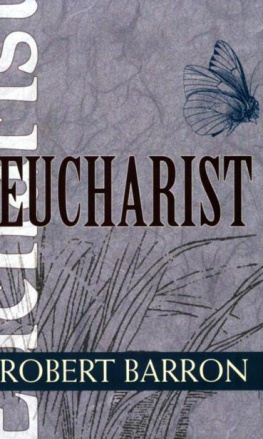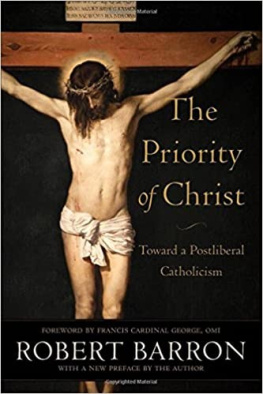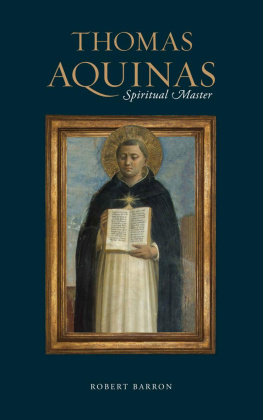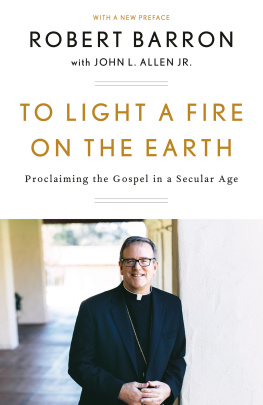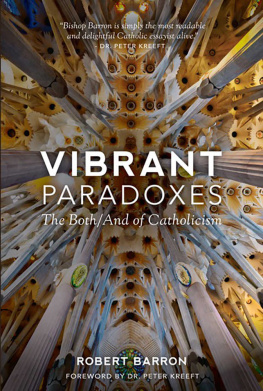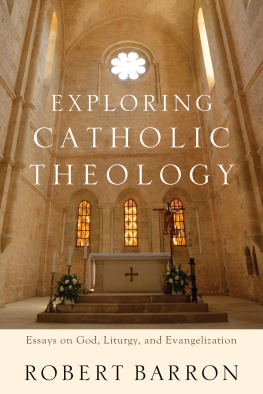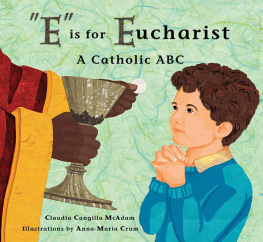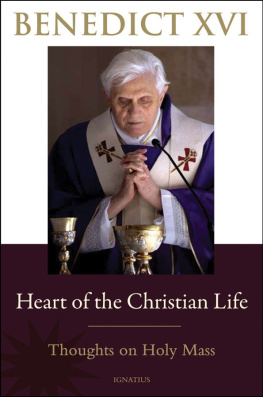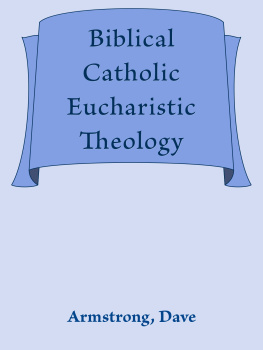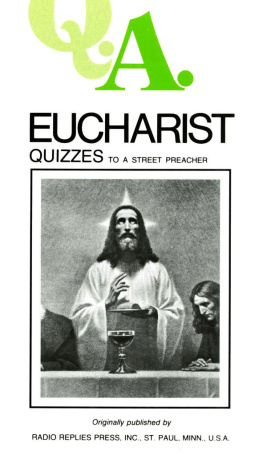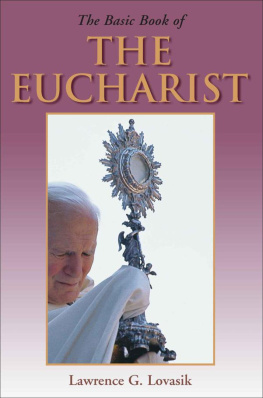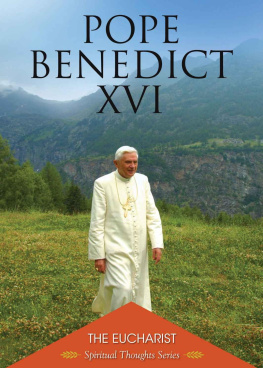Robert Barron - Eucharist
Here you can read online Robert Barron - Eucharist full text of the book (entire story) in english for free. Download pdf and epub, get meaning, cover and reviews about this ebook. year: 2008, publisher: Orbis Books, genre: Religion. Description of the work, (preface) as well as reviews are available. Best literature library LitArk.com created for fans of good reading and offers a wide selection of genres:
Romance novel
Science fiction
Adventure
Detective
Science
History
Home and family
Prose
Art
Politics
Computer
Non-fiction
Religion
Business
Children
Humor
Choose a favorite category and find really read worthwhile books. Enjoy immersion in the world of imagination, feel the emotions of the characters or learn something new for yourself, make an fascinating discovery.
- Book:Eucharist
- Author:
- Publisher:Orbis Books
- Genre:
- Year:2008
- Rating:4 / 5
- Favourites:Add to favourites
- Your mark:
- 80
- 1
- 2
- 3
- 4
- 5
Eucharist: summary, description and annotation
We offer to read an annotation, description, summary or preface (depends on what the author of the book "Eucharist" wrote himself). If you haven't found the necessary information about the book — write in the comments, we will try to find it.
Eucharist — read online for free the complete book (whole text) full work
Below is the text of the book, divided by pages. System saving the place of the last page read, allows you to conveniently read the book "Eucharist" online for free, without having to search again every time where you left off. Put a bookmark, and you can go to the page where you finished reading at any time.
Font size:
Interval:
Bookmark:

Catholic Spirituality for Adults
General Editor
Michael Leach
Other Books in the Series
Diversity of Vocations
Holiness
Prayer
Reconciliation

Robert Barron


Maryknoll, New York 10545
Chapter One
Chapter Two
Chapter Three
Lpilogue
Catholic Spirituality for Adults
 ATIIOLIC SPIRITUALITY FOR ADULTS explores the deepest dimension of spirituality, that place in the soul where faith meets understanding. When we reach that place we begin to see as if for the first time. We are like the blind man in the Gospel who could not believe his eyes: "And now I see!"
ATIIOLIC SPIRITUALITY FOR ADULTS explores the deepest dimension of spirituality, that place in the soul where faith meets understanding. When we reach that place we begin to see as if for the first time. We are like the blind man in the Gospel who could not believe his eyes: "And now I see!"
Catholicism is about seeing the good of God that is in front of our eyes, within us, and all around us. It is about learning to see Christ Jesus with the eyes of Christ Jesus, the Way, the Truth, and the Life.
Only when we see who we are as brothers and sisters of Christ and children of God can we begin to be like Jesus and walk in his Way. "As you think in your heart, so you are" (Prov. 23:7).
Catholic Spirituality for Adults is for those of us who want to make real, here and now, the words we once learned in school. It is designed to help us go beyond information to transformation. "When I was a child, I spoke as a child, I understood as a child, I thought as a child, hut when I became an adult, I put away childish things" (I Cor. 13:1 1).
The contributors to the series are the best Catholic authors writing today. We have asked them to explore the deepest dimension of their own faith and to share with us what they are learning to see. Topics covered range from prayer - "Be still, and know that I am God" (Ps. 46:10)-to our purpose in life -coming to know "that God has given us eternal life, and this life is in his Son" (1 John 5:11 ) - to simply getting through the day - "Put on compassion, kindness, humility, gentleness, and patience" (Col. 3:12).
Each book in this series reflects Christ's active and loving presence in the world. The authors celebrate our membership in the mystical body of Christ, help us to understand our spiritual unity with the entire family of God, and encourage us to express Christ's mission of love, peace, and reconciliation in our daily lives.
Catholic Spirituality for Adults is the fruit of a publishing partnership between Orhis Books, the publishing arm of the Catholic Foreign Mission Society of America (Maryknoll), and RC1. Benziger, a leading provider of religious and family life education for all ages. This series is rooted in vital Catholic traditions and committed to a continuing standard of excellence.
Michael Leach
General Editor
The fathers of the Second Vatican Council expressed this truth in a lyrical and oft-repeated phrase from the document Lumen Centium (no. "the Eucharist is the source and summit of the Christian life." It is both the fountain from which life in Christ flows and the goal toward which it tends; it is the alpha and the omega of Christian discipleship; it is the energy without which authentic Christianity runs down. Without the Eucharist, we could he a pious congregation of like-minded people or a society dedicated to the memory and teaching of Jesus, but we couldn't possibly he the church. As John Paul II argued in what was, fittingly enough, his last encyclical, Ecclesia de F:ucharistia (the church comes from the Eucharist), the body and blood of Jesus are not simply the sacred objects at the center of the church's concern; they are the church, its lifeblood and raison d'etre.
In one of his sermons on the Eucharist, the great English Catholic preacher Ronald Knox made the following observation. The vast majority of Jesus' commands - to love one's enemies, to turn the other cheek, to forgive seventy times seven times, etc. - have been rather consistently disregarded. (As Chesterton pointed out, it is not that Christianity has been tried and found wanting but rather that it has been found difficult and never tried). However, Knox says, amid all of these commandments honored, at best, in the breach, there is one command of Jesus that has, up and down the centuries, been massively obeyed. Throughout the long history of the church, through a whole series of dramatic successes and failures, despite the stupidity and wickedness of so many Christians, the command "do this in memory of me" has been and continues to be obeyed. It is as though Christians, in all of their sin, have realized from the beginning that the spiritual life depends upon the Eucharist the way that physical life depends upon food, oxygen, and water. And so, almost despite themselves, they do what Jesus told them to do in his memory.
The topic of the Eucharist is huge and multivalent. Thousands of treatises, essays, sermons, and reflections have been dedicated to it over the centuries. Its mysteries and dimensions are endless precisely because the Eucharist is Christ, the one in whom, according to Paul, are hidden all the treasures of wisdom and knowledge. One could easily construct an entire systematic theology around the central motif of the Eucharist, showing how it is intimately related to the doctrines of creation, revelation, Christology, grace, redemption, and the last things. However, I am going to follow the lead of many eucharistic commentators and focus finally on three major themes: meal, sacrifice, and real presence.

The Eucharist is not a luxury, but a necessity, for without it, we would, in the spiritual sense, starve to death.
The Eucharist is, first, the great meal of fellowship that God wants to establish with his people, the joyful bond in which the divine life is shared spiritually and physically with a hungry world. However-and this will emerge as a major argument of this hook - communion in a fallen world is impossible without sacrifice. In a universe that has become twisted and off-kilter, beset by division, hatred, and fear, the establishment of real love and justice will come only at the price of suffering. Hence, the Eucharist is also the embodiment of Jesus' great act of sacrificial suffering on the cross at Calvary; in the separate consecration of the bread and the wine, we see, symbolically expressed, the separation of Christ's body and blood that took place in the process of his dying. What we eat and drink at the fellowship meal, therefore, is nothing other than the death of Jesus, the act by which he gave himself away for the salvation of the world. And both of these themes are gathered up and given full expression in the Catholic doctrine of the "real" presence of Jesus in the eucharistic elements. Though it contains a symbolic dimension, the Eucharist is more than a symbol, more than a concoction, however moving and evocative, of our own religious imagination. In it, Jesus is present to us through his own power and in his dense objectivity as both food and sacrificial offering. There is something terrible and uncontrollable in the reality of this presence. The Eucharist is not our product, but our Lord, and as such, it calls us to conversion. The rest of this hook will he a further elaboration of the three themes that I have just sketched.
Font size:
Interval:
Bookmark:
Similar books «Eucharist»
Look at similar books to Eucharist. We have selected literature similar in name and meaning in the hope of providing readers with more options to find new, interesting, not yet read works.
Discussion, reviews of the book Eucharist and just readers' own opinions. Leave your comments, write what you think about the work, its meaning or the main characters. Specify what exactly you liked and what you didn't like, and why you think so.

